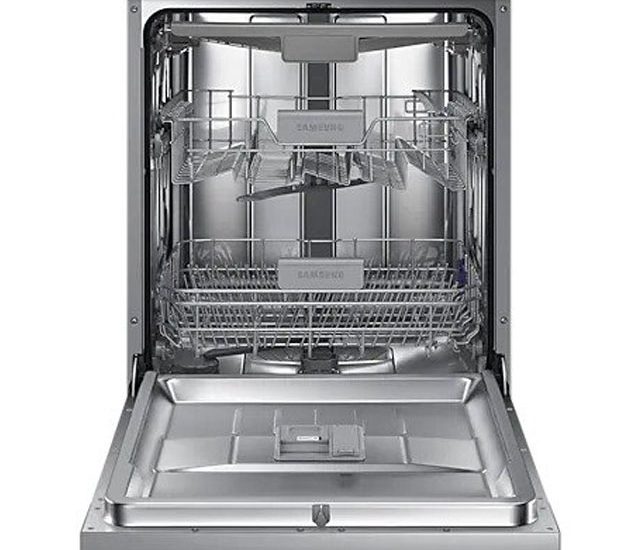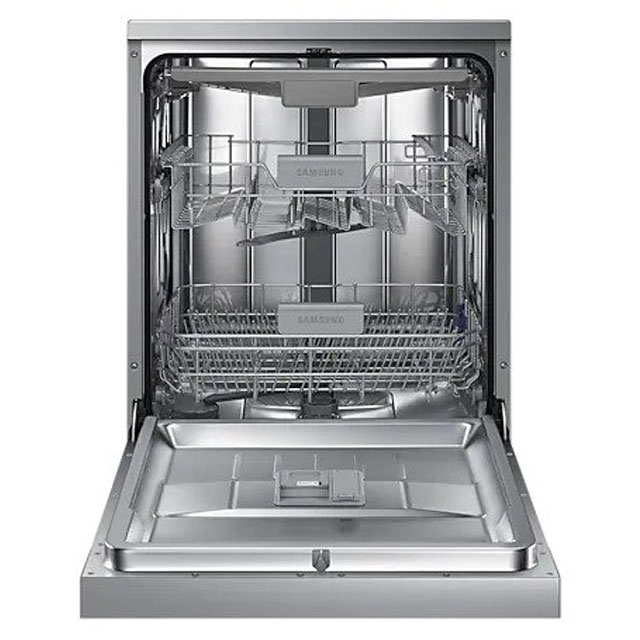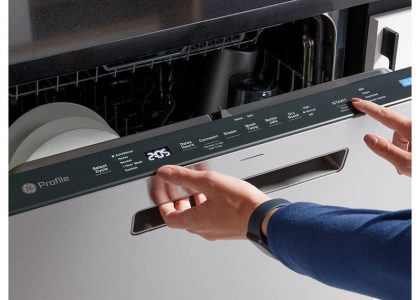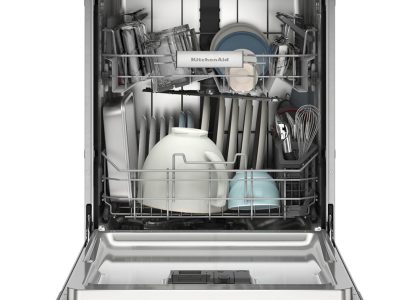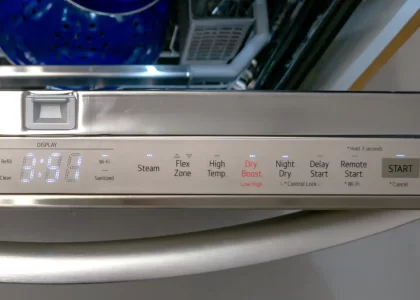Understanding Dishwasher Energy Use
How much energy does a dishwasher use? Understanding how much energy a dishwasher uses is vital for any household. Knowing this can help manage your energy bills and reduce your carbon footprint. Here are some key points to consider when looking at dishwasher energy use:
- Type of Dishwasher: Different types have different energy needs. Compact and standard models vary in consumption.
- Energy Star Rating: Look for appliances with an Energy Star rating. They use less energy than non-rated models.
- Wash Cycles: Different cycles consume different amounts of energy. Eco-friendly cycles use less power.
- Water Temperature: Hotter water means more energy. Some dishwashers heat water internally, which can be efficient.
- Age of Dishwasher: Older models tend to use more energy. Newer models are designed to be more efficient.
By keeping these factors in mind, you can get a sense of the energy your dishwasher requires. Remember, the goal is to optimize for efficiency. This way, you save power and money while minimizing the environmental impact.
The Factors That Affect Dishwasher Energy Consumption
When examining dishwasher energy usage, several factors come into play that can significantly influence the amount of energy consumed. Understanding these elements is crucial for selecting an energy-efficient dishwasher or optimizing the use of your current model. Here are the vital factors to consider:
- Load Capacity: A dishwasher’s energy consumption often depends on its load capacity. Larger capacity models may use more energy per cycle but can be more efficient per dish when fully loaded.
- Drying Mechanism: Some dishwashers come with heated drying which can use a lot of energy. Models with air-drying options or those that use heat generated from the wash cycle can be more energy-efficient.
- Built-in Heaters: Dishwashers with built-in heaters to warm the water can consume more power, but can also be efficient if your home’s water heater is less so.
- Frequency of Use: How often you run your dishwasher impacts energy use. Running it less frequently with full loads is more efficient than many partial loads.
- Maintenance: Poorly maintained dishwashers might have to work harder, using more energy. Regular maintenance can improve efficiency.
- Sensor Technology: Newer models often have sensors to adjust water usage and cycle time based on how dirty the dishes are, resulting in potential energy savings.
- Energy-saving Features: Some dishwashers have specific settings designed to save energy, such as eco-wash cycles.
By considering these factors and how they relate to your household’s dishwashing habits, you can make informed decisions to minimize the energy your dishwasher uses. In turn, this can lead to reduced utility bills and a smaller environmental footprint.
Average Energy Use of Dishwashers: What to Expect
When you’re calculating how much energy a dishwasher uses, it’s useful to know the average consumption. Most dishwashers use around 1.5 kWh per load. Yet, this number can vary. The range typically falls between 1 kWh and 2 kWh per cycle. Factors impacting this average include the model, type, and age of the machine. Energy Star-rated dishwashers can go as low as 1 kWh per load.
- Standard Models: These might use closer to 1.5 kWh to 2 kWh per cycle.
- Compact Models: They tend to use slightly less energy, around 1 kWh to 1.5 kWh per load.
- Energy Star-Rated: Such models are more efficient, often using near 1 kWh per cycle.
To put this into perspective, this is less than most central air conditioning units per hour. However, unlike air conditioners, dishwashers are not typically used daily. So, your actual monthly energy consumption will depend on how often you run your machine. If you’re trying to estimate costs, consider your personal usage frequency and any eco-friendly features your machine may have. These can lower the energy use each time you run a wash cycle.
Comparing Energy Use Between Dishwasher Models
When choosing a dishwasher, compare the energy use of different models carefully. Different brands and models will vary in how much energy they use. Here we will look into how energy use can differ between dishwasher models and what that means for you, both in terms of energy bills and environmental impact.
- Energy Star-Rated Models: These dishwashers are often the most efficient. They use around 1 kWh per cycle.
- Conventional Models: Older or non-rated models may use up to 2 kWh per load.
- Integrated Heaters: Models with built-in water heaters can be efficient, but they may still vary in energy use.
- Size and Capacity: Compact models usually consume less energy, but check the efficiency per load. Standard models use more energy but can wash more dishes at once.
Look for features like eco-wash cycles or air-dry options that lower energy use. Some dishwashers have sensors that adjust for the size of the load or soil level, which can conserve energy. Manufacturers provide energy consumption details in the product specifications. Make sure to read these carefully to understand the energy profile of each model.
Reduce costs and help the environment by choosing a model with lower energy consumption. Remember that the upfront cost of an energy-efficient model can be offset by the savings on your energy bills. Always consider your household needs and choose a dishwasher that balances efficiency and performance.
Tips to Reduce Dishwasher Energy Consumption
To cut back on the energy your dishwasher uses, try these practical tips:
- Run Full Loads: Wait until you have a full load before running your dishwasher. This minimizes the number of cycles you need to do.
- Air Dry: Choose the air-dry function over heated drying. This can save a significant amount of energy.
- Eco-friendly Cycles: Use eco-friendly or economy wash cycles. These are designed to use less water and energy.
- Avoid Pre-Rinsing: Skip pre-rinsing dishes. Modern dishwashers can handle some food scraps.
- Load Efficiently: Stack dishes neatly. This helps them get clean the first time, avoiding re-washes.
- Maintain Regularly: Clean the filters and check for blockages. This makes sure your dishwasher runs efficiently.
- Heat Water Wisely: If your dishwasher doesn’t have a heater, run the hot water in the sink first. This helps the dishwasher start with hot water, saving energy.
- Upgrade to Efficient Models: Consider replacing old appliances with Energy Star-rated models for better efficiency.
Implement these strategies to make your dishwasher usage more energy-efficient. Doing so will help reduce your energy bills and protect the environment.
The Role of Energy-Efficient Dishwashers in Saving Power
The switch to energy-efficient dishwashers is more than a trend; it’s a conscious choice for power savings. These machines are designed with conservation in mind. They come with integrated systems to minimize energy use without sacrificing cleaning power. If you’re considering how much energy a dishwasher uses, it’s important to explore the benefits of energy-efficient models. Here’s how these appliances pave the way for energy savings:
- Lower Energy Bills: Energy-efficient dishwashers consume less power, which translates to reduced energy bills over time.
- Eco-Friendly: These models support a greener lifestyle, cutting down on carbon emissions associated with high energy consumption.
- Advanced Technology: Modern dishwashers often have sensors and optimized cycles that adjust energy usage based on the load.
- Long-Term Cost Benefits: While the upfront cost might be higher, energy-efficient dishwashers save money in the long run through lower utility bills.
- Regulatory Compliance: Many regions now mandate energy efficiency standards for appliances, steering consumers towards energy-saving options.
Adopting an energy-efficient dishwasher can make a significant difference to your energy consumption. Remember to look for the Energy Star label when selecting a new model. Such appliances have been tested and verified to use less energy. By doing so, you’ll be taking a step towards a sustainable home and contributing to a healthier environment. Choose wisely, reduce consumption, and enjoy the dual benefits of a clean kitchen and a smaller energy footprint.
Dishwasher Usage Habits and Energy Impact
Your dishwasher usage habits can greatly affect your energy consumption. Let’s dive into how your routine impacts energy use:
- Frequency of Runs: More runs mean more energy. Try to run only full loads.
- Selection of Cycle: Shorter, eco-friendly cycles use less energy compared to heavy-duty options.
- Dish Preparation: Skipping pre-rinsing saves water and energy, as modern dishwashers are quite capable.
- Load Organization: Properly loaded dishwashers clean more effectively, reducing the need for additional cycles.
- Timely Maintenance: Keeping your dishwasher in top shape ensures it runs efficiently.
By adjusting these habits, you can effectively reduce the energy your dishwasher uses. This not only lowers your bills but is also better for the environment. Adapting to more responsible usage is key for energy efficiency and long-term savings. Small changes in your daily routine can have a significant effect on your overall energy usage.
The Future of Dishwasher Energy Efficiency
The future of dishwasher energy efficiency looks promising. Innovations are constantly underway to make dishwashers even more energy-saving and effective. As we look ahead, here are some expected trends:
- More Energy Star Models: We can anticipate a wider range of Energy Star-rated dishwashers. This means more options for reduced energy use.
- Advanced Sensors and AI: Dishwashers will likely use smarter technology. Predictive sensors and artificial intelligence could optimize wash cycles for maximum efficiency.
- Solar Power Adaptability: Future models might be compatible with solar power, allowing for renewable energy use.
- Improved Heat Exchangers: Newer heat exchange systems could reuse heat more effectively. This would cut down on the energy needed to heat water.
- Water Usage Reduction: With a focus on conservation, we may see dishwashers that use even less water, decreasing the energy required for heating.
- Better Integration with Smart Homes: Future dishwashers are expected to be fully integrated into smart home ecosystems, allowing for better energy management.
How much energy does a dishwasher use? These advancements will help households save on energy costs. They will also contribute to a lower environmental impact. By choosing energy-efficient models and practicing good usage habits, consumers can look forward to a more sustainable future. Keep an eye out for these innovations as you consider how much energy a dishwasher uses in your home.

